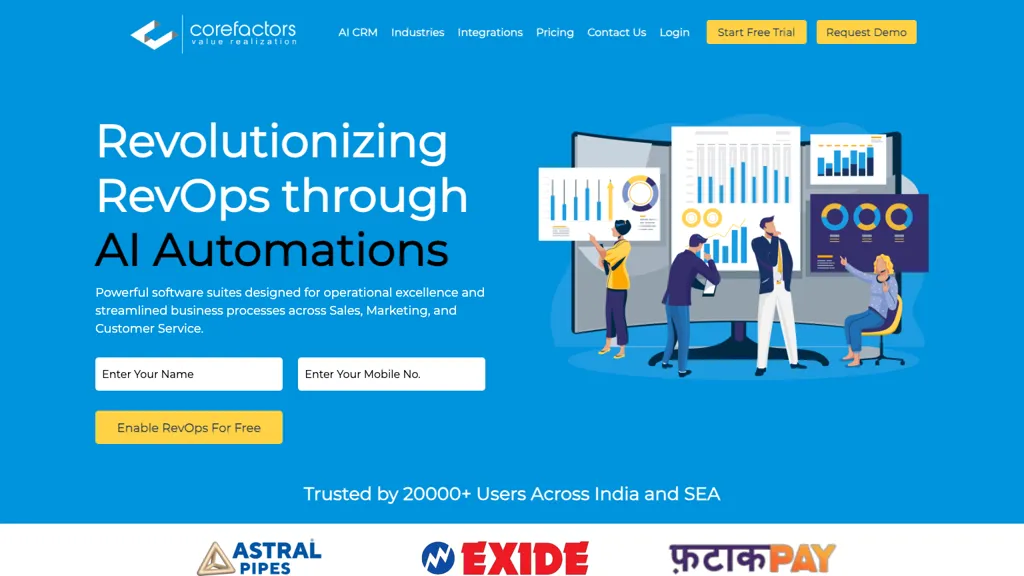What is Corefactors AI CRM?
Corefactors is an advanced artificial intelligence-driven Customer Relationship Management Software; it allows transformation of revenue operations with improved automation and optimization processes for sales, marketing, and customer service. This integrates better with data collection and its mobilization across real-time measurement, analysis, and providing valuable insights for the entire customer journey.
Corefactors AI CRM brings all customer-facing functions on to a single platform to work in tandem with a common goal of business development. The suite is divided into Service Box—the support box for delivering excellent service; Sales Box to control and manage the sales process; Marketing Box for automated marketing communication; and Success Box to enhance customer retention.
Key Features and Benefits of Corefactors AI CRM
- Automates and streamlines sales, marketing, and customer service processes, respectively.
- Systemize data collection, measurement, and analysis to derive real-time insights.
- Bring all customer-facing teams on one platform to pursue perfect collaboration.
- These involve extensive functionality for the Sales Box, Marketing Box, Support Box, and Success Box.
- Lead management, task automation, omni-channel communication, and renewal automation.
All of these features ensure a host of benefits, such as smoothing the revenue generation processes, higher collaboration among teams, and unlocking untapped potential within organizations.
Use cases and applications of Corefactors AI CRM
Various cases can be applied using Corefactors AI CRM to improve business processes. For instance:
- Automate the process of scoring and nurturing the lead efficiently on multiple touchpoints, enabling the lead to be converted into a customer.
- Enhance customer engagement through personalized, targeted marketing communication ensuing from the marketing box and increase brand visibility to drive revenue growth.
- Supports and drives collaboration in real time among sales, marketing, and customer support teams so that organizations can take the best decisions possible to optimize the whole of the customer lifecycle together.
Corefactors AI CRM is used by different groups of people such as sales teams, marketing teams, customer service teams, businesses, and revenue teams that use it in detail.
How to Use Corefactors AI CRM
Using Corefactors AI CRM is super easy and takes a few simple steps:
- Sign up for a free trial to have a clear view of the functionality and features of the CRM.
- Learn how to use the user interface of the platform and how to get around it with all the modules: Sales Box, Marketing Box, Support Box, and Success Box.
- Set up your account by importing all your existing customer data and setting up any other important settings.
- Organize and prioritize your sales pipeline using the Lead Management tool.
- Automate routine tasks and marketing communications. Save time, be efficient.
- Real-time collaboration will ensure a united approach to client engagement and retention.
- Therefore keep monitoring your CRM status every so often and keep developing the strategies based on inputs given by Corefactors AI CRM.
How Corefactors AI CRM Works
Corefactors AI CRM operates with the help of state-of-the-art CNNs and LSTMs in an effort to ensure maximum effectiveness in business process streamlining and optimization. The platform hooks in a wide array of models to workflows to serve seamless data collection, analysis, and decision-making.
Customer data is collected through multiple avenues, and it is then systematically arranged and analyzed for insights. The very insights are utilized in automatizing functions, customizing marketing messages, and optimizing the interactions of sales and support to build a robust and result-oriented approach towards managing customer relationships.
Corefactors AI CRM Pros and Cons
Just like every other software existing, Corefactors AI CRM has a few pros and some possible cons, which include the following:
Pros:
- An all-in-one package for Sales, Marketing, Support, and Customer Success.
- Real-time insights and analytics, to drive better decisions.
- Better collaboration with the team and one single system of engagement with the customers.
- Automation of routine tasks that will function more effectively and save working hours.
Cons:
- It might present a learning curve.
- Pricing could be a problem for small-scale businesses with meager budgets.
Generally, user feedback places Corefactors AI CRM in an effective, versatile slot, though some users feel it’s slow to set up and navigate about.
Conclusion of Corefactors AI CRM
Corefactors’ AI CRM offers a single and flexible solution seamlessly integrating sales, marketing, support, and customer success functionality. Using advanced AI capabilities by Corefactors, it unleashes real-time insights and process automation through enabling team collaboration, hence providing a tool for companies in their revenue operations.
Future enhancements and upgrades need to be developed that will enhance the power of the platform. The following are what will make Corefactors AI CRM take the leadership in the innovation of CRM. Corefactors AI CRM has the rights tools and features that infinitely increase success and growth for your sales team, marketing team, or customer service team.
Corefactors AI CRM Frequently Asked Questions
What do you mean by Corefactors AI CRM?
Corefactors AI CRM is an AI-powered CRM software suite to automate and optimize sales, marketing, and customer service. The software is useful for sales teams, marketing teams, customer service professionals, businesses, and revenue teams. It offers the following pricing plans:
- Seed plan at $27 per month
- Sapling plan at $45 per month
- Tree plan at $94 per month
- Basic plan at ₹30,000 per user annually
Can I use Corefactors AI CRM for free?
Yes, you can use Corefactors AI CRM for free. They provide some free trial period options to avail by users to use this platform for a while before going to any paid plan.
What are the key features of Corefactors AI CRM?
Its most important features include: automation of the sales process, marketing communications, and customer support; real-time data insights; lead and task management; omni-channel communication; and renewal automation.










